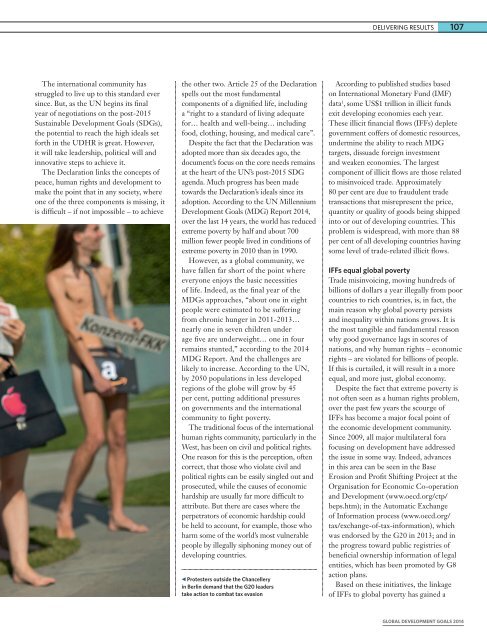FAMBB
FAMBB
FAMBB
You also want an ePaper? Increase the reach of your titles
YUMPU automatically turns print PDFs into web optimized ePapers that Google loves.
DELIVERING RESULTS107The international community hasstruggled to live up to this standard eversince. But, as the UN begins its finalyear of negotiations on the post-2015Sustainable Development Goals (SDGs),the potential to reach the high ideals setforth in the UDHR is great. However,it will take leadership, political will andinnovative steps to achieve it.The Declaration links the concepts ofpeace, human rights and development tomake the point that in any society, whereone of the three components is missing, itis difficult – if not impossible – to achievethe other two. Article 25 of the Declarationspells out the most fundamentalcomponents of a dignified life, includinga “right to a standard of living adequatefor… health and well-being… includingfood, clothing, housing, and medical care”.Despite the fact that the Declaration wasadopted more than six decades ago, thedocument’s focus on the core needs remainsat the heart of the UN’s post-2015 SDGagenda. Much progress has been madetowards the Declaration’s ideals since itsadoption. According to the UN MillenniumDevelopment Goals (MDG) Report 2014,over the last 14 years, the world has reducedextreme poverty by half and about 700million fewer people lived in conditions ofextreme poverty in 2010 than in 1990.However, as a global community, wehave fallen far short of the point whereeveryone enjoys the basic necessitiesof life. Indeed, as the final year of theMDGs approaches, “about one in eightpeople were estimated to be sufferingfrom chronic hunger in 2011-2013…nearly one in seven children underage five are underweight… one in fourremains stunted,” according to the 2014MDG Report. And the challenges arelikely to increase. According to the UN,by 2050 populations in less developedregions of the globe will grow by 45per cent, putting additional pressureson governments and the internationalcommunity to fight poverty.The traditional focus of the internationalhuman rights community, particularly in theWest, has been on civil and political rights.One reason for this is the perception, oftencorrect, that those who violate civil andpolitical rights can be easily singled out andprosecuted, while the causes of economichardship are usually far more difficult toattribute. But there are cases where theperpetrators of economic hardship couldbe held to account, for example, those whoharm some of the world’s most vulnerablepeople by illegally siphoning money out ofdeveloping countries.Protesters outside the Chancelleryin Berlin demand that the G20 leaderstake action to combat tax evasionAccording to published studies basedon International Monetary Fund (IMF)data 1 , some US$1 trillion in illicit fundsexit developing economies each year.These illicit financial flows (IFFs) depletegovernment coffers of domestic resources,undermine the ability to reach MDGtargets, dissuade foreign investmentand weaken economies. The largestcomponent of illicit flows are those relatedto misinvoiced trade. Approximately80 per cent are due to fraudulent tradetransactions that misrepresent the price,quantity or quality of goods being shippedinto or out of developing countries. Thisproblem is widespread, with more than 88per cent of all developing countries havingsome level of trade-related illicit flows.IFFs equal global povertyTrade misinvoicing, moving hundreds ofbillions of dollars a year illegally from poorcountries to rich countries, is, in fact, themain reason why global poverty persistsand inequality within nations grows. It isthe most tangible and fundamental reasonwhy good governance lags in scores ofnations, and why human rights – economicrights – are violated for billions of people.If this is curtailed, it will result in a moreequal, and more just, global economy.Despite the fact that extreme poverty isnot often seen as a human rights problem,over the past few years the scourge ofIFFs has become a major focal point ofthe economic development community.Since 2009, all major multilateral forafocusing on development have addressedthe issue in some way. Indeed, advancesin this area can be seen in the BaseErosion and Profit Shifting Project at theOrganisation for Economic Co-operationand Development (www.oecd.org/ctp/beps.htm); in the Automatic Exchangeof Information process (www.oecd.org/tax/exchange-of-tax-information), whichwas endorsed by the G20 in 2013; and inthe progress toward public registries ofbeneficial ownership information of legalentities, which has been promoted by G8action plans.Based on these initiatives, the linkageof IFFs to global poverty has gained aGLOBAL DEVELOPMENT GOALS 2014


